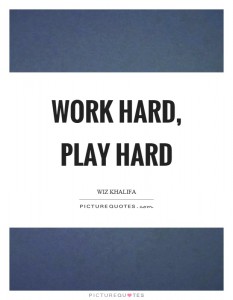I’m writing this today whilst basking in glorious sunshine in my garden (well, I call it a garden, it’s more like a yard really). Whilst that might not seem like something to even give a thought to, to me it’s a  breakthrough in choosing, no, allowing myself the time and space to just sit and enjoy life without feeling the need to be doing anything (ok, so writing this can indeed be classified as ‘doing something’ but I’m sure you get the point). For someone who for most of their life has felt guilty for even taking 5 minutes out of the working day to get some fresh air, how have I finally come to the point where embracing doing nothing is ok and even feels good? It’s all to do with my new found understanding of balance. For, in this instance, I’ve just spent the past hour and a half engaged in flute practice, toiling away at technical exercises and repertoire for forthcoming concerts in the sweltering heat. Which, whilst I would be the first to say I enjoyed it, it can only be described at best as pretty uncomfortable when you have to keep stopping to prevent your instrument sliding out of your hands for the 20th time. So to achieve balance, I’m now enjoying the heat outside with my favourite mug full of coffee (something else which isn’t compatible during flute practice!)
breakthrough in choosing, no, allowing myself the time and space to just sit and enjoy life without feeling the need to be doing anything (ok, so writing this can indeed be classified as ‘doing something’ but I’m sure you get the point). For someone who for most of their life has felt guilty for even taking 5 minutes out of the working day to get some fresh air, how have I finally come to the point where embracing doing nothing is ok and even feels good? It’s all to do with my new found understanding of balance. For, in this instance, I’ve just spent the past hour and a half engaged in flute practice, toiling away at technical exercises and repertoire for forthcoming concerts in the sweltering heat. Which, whilst I would be the first to say I enjoyed it, it can only be described at best as pretty uncomfortable when you have to keep stopping to prevent your instrument sliding out of your hands for the 20th time. So to achieve balance, I’m now enjoying the heat outside with my favourite mug full of coffee (something else which isn’t compatible during flute practice!)
We all know that balance in most aspects life is something which works on paper but is damn well near impossible to achieve. Despite this, it is something that I believe should always be at the forefront of our minds. It’s all too easy to get caught up in the busyness of the everyday without taking stock of where we are going and what we are trying to achieve. Ultimately then, it is only when we consider how to find a sense of balance that we begin to find that life flows better and we get the results we are looking for.
Not only do I think that our lives can benefit from this philosophy, but also our music making. I’m sure the musicians reading this would agree that everyone has aspects of their playing that they naturally find easier to achieve than others, be it dynamic contrasts, articulation or rhythmic precision (the latter is certainly not something I can boast about!) Therefore it’s probably not new advice to you that the remaining elements (finger work, scales, tone etc.) will require more focus to bring them up to standard. But beyond this, where else is balance important? Well, even choosing repertoire and exercises requires balance – does it provide the right level of challenge for me as a player at this moment in time? Then, how are we going to choose which pieces to select for an upcoming performance? Surely the balance between styles, moods and keys alongside audience expectation and setting should always be paramount here.
Beyond this then, how about the approach of a piece of music itself? Surely the biggest balancing act of all concerns technique and interpretation. In a recent episode of the brilliant talking flutes podcast, flutist Elisabet Franch, in conversation with Jean-Paul Wright, raises this point beautifully when she talks about the balance between technique and ‘passion for the music’ (you can listen to the episode here). Often I think this is overlooked, with the emphasis being too firmly placed on technique and ‘getting it right’ above what we as performers wish to express.
So the next time you’re practising, or even find yourself contemplating life itself (both equally important pastimes!), remember to consider how balance, in so many ways, can provide the key to getting the results you desire.


